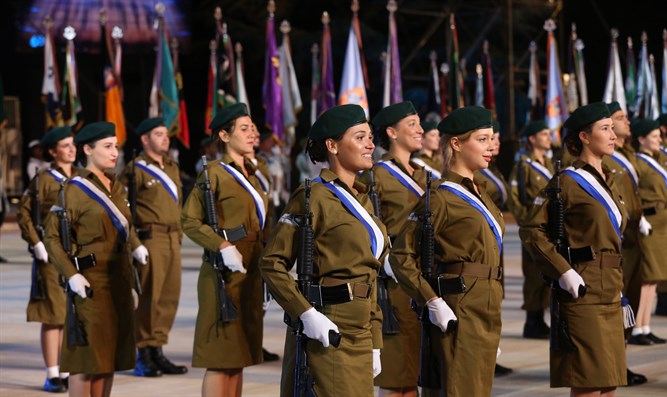
Committees to investigate whether girls are religious enough for an exemption, although law only requires kashrut & Shabbat observance.
According to the letter of the law, any girl who reaches draft age and signs a declaration that she eats only kosher food and does not travel on Shabbat, is entitled to an exemption from IDF service.
In October, 2020, legislation was passed entitling the IDF to challenge such declarations and even revoke them, and on Wednesday, the Knesset passed, in its first reading, an extension of three years to this law, with 55 MKs voting in favor and 50 against.
This law provides for the establishment of committees that investigate the religious observance of Jewish girls who claim that they adhere to a traditional lifestyle and that they do not wish to serve in the IDF. The committees monitor girls they consider suspect, and in many cases also require such girls to present themselves for a test on religious issues.
If committee members are not satisfied with the information obtained, they have the authority to revoke IDF exemptions.
The Knesset debate prior to the vote was stormy as predicted, Behadrey Haredim reports, with many MKs decrying the legislation.
“What did the Chief Rabbinate – the halakhic authority of the State of Israel – have to say on this issue of drafting girls into the IDF?” demanded MK Moshe Gafni? “The Rabbinate stated that it is absolutely forbidden. Why are you bringing this law to a vote now? What for? You really want to go into minute detail about whether a girl made Kiddush on Shabbat, whether she’s really traditional? Is this a democratic state?”
“This is forbidden, yehareg ve’al ya’avor [a sin that one is forbidden to commit even if one must give up his life due to refusal to submit] … This law goes against the decisions of all the rabbis of Israel.”
MK Uri Maklev (UTJ) also attacked the proposed legislation, saying: “Our position is that women do not fight in battle … This law is based on an invalid premise which grants an official the power to decide, by himself, whether or not another person is religious. It gives that person the authority to choose not to recognize the way another person lives, and this is extremely problematic.”
This law demands “the establishing of committees with private investigators who will pry into the details of the lives of these women,” said Shas head MK Aryeh Deri. “The government does not do this when investigating someone who wants to convert to Judaism in order to receive citizenship, even when you know that many of them do not observe the Torah and the commandments.”
“But when it comes to this matter [of IDF service], this is what you want. In a functioning state, women should only be recruited into the armed forces on a voluntary basis. And I regret that the United Arab List is voting in favor, even though this contradicts its ideology.”
Responding to MK Deri was MK Elazar Stern (Yesh Atid), who said, “I’m surprised at you – you should have been the first person to say that you want the Defense Ministry to check the declarations these girls make [attesting that they are traditionally observant]. When a singer wants to convert, you tell her: first stop practicing your profession, but when we’re dealing with girls who tell us that enlisting contradicts their religion and conscience and we discover it’s not so, you’re objecting? You should have been proposing this law, not us.”
MK Ahmad Tibi of the Joint List also spoke during the Knesset discussion, decrying the decision of the United Arab List to support the legislation. “For decades, Arab MKs have not voted in favor of any such law,” he said, “and I think that the MKs from the United Arab List have made a grave mistake. This is the price you are paying for joining the coalition.”
MK Yisrael Eichler (UTJ) asked his fellow Knesset members to “imagine to yourselves that the Rabbinate got up one day and announced that it was establishing committees of inquiry to investigate the level of religious observance of this person or that. You would be up in arms, screaming that it was an Inquisition,” he accused.
“But now, when it’s the Defense Ministry doing that, checking up on girls to see whether they really know Jewish laws, whether they really are traditional, you’re fine with it … The law requires only a declaration that the girl in question does not travel on Shabbat and that she eats kosher food. She doesn’t need to know the entire body of Jewish law. What these committees are trying to do is coerce these girls to enlist.”
Also criticizing the proposed legislation was MK Meir Porush (UTJ), who pointed out that, “A girl who is learning in a haredi high school is granted a draft exemption with no questions asked, as the authorities know that there’s no point in starting up with her. But when it comes to a girl who doesn’t learn in a haredi institution, even if she is religiously observant as far as the law is concerned, they don’t give her an exemption and start to investigate and make demands instead.
“What is such a girl supposed to think,” MK Porush continued, “when she sees [Prime Minister] Bennett signing a promise – in front of the entire country – ‘I will not sit in the same government as [MK Yair] Lapid’ or when Lapid declares, ‘I won’t enter a government that uses the Norwegian Law’ – and they don’t keep their promises?”
“Jow dare they persecute a girl who doesn’t travel on Shabbat, who observes kashrut, who does what the law demands of her? Shame on you.”
(Arutz 7).